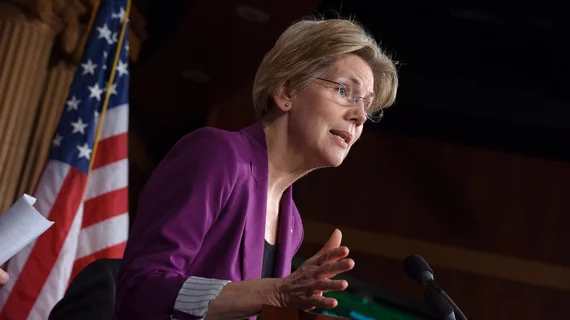Senators propose bill empowering AGs to claw back ill-gotten profits from private equity-backed providers
Two U.S. lawmakers have proposed a bill that would empower attorneys general and the Department of Justice to “claw back” ill-gotten gains from private equity-backed provider groups.
Democratic Sens. Ed Markey and Elizabeth Warren introduced the Corporate Crimes Against Health Care Act of 2024 on June 11. Their aim is to root out “corporate greed and private equity abuse” in medicine. Currently without Republican backing, the bill faces slim prospects of passing in a divided Senate.
Markey and Warren believe that “lax” corporate accountability and transparency laws have provided cover for PE to “plunder hospitals, nursing homes, provider practices and other healthcare entities with impunity.” The two senators cited Steward Health Care, which operates eight hospitals in Massachusetts, as an example.
Alleged mismanagement by CEO Ralph de la Torre, other executives and PE firm Cerberus Capital Management helped propel Dallas-based Steward into bankruptcy last month.
"My Corporate Crimes Against Health Care Act would prevent what happened with Steward from ever happening again,” Warren said in a statement. “When private equity gets hold of healthcare systems, it is literally a matter of life and death, so if you drive a hospital like Steward into bankruptcy, putting patients and communities at risk, you should face real consequences.”
Senators propose creating a criminal penalty of up to six years in prison for executives overseeing firms that “loot” healthcare entities such as nursing homes or hospitals, resulting in patient death. AGs could claw back compensation, including salaries, issued to PE and portfolio company execs within a 10-year period before or after an acquisition leading to “avoidable financial difficulties due to that looting.” The bill also would authorize an associated civil penalty of up to five times the claw-back amount. Among other provisions, it would require providers receiving federal funding to publicly report M&A changes and mandate that HHS report to Congress on the harms of corporatization.
The bill has support from organizations including the Massachusetts Nurses Association, Americans for Financial Reform, and the American Federation of Teachers and Community Catalyst, which are all quoted in the senators’ announcement.
“The crisis at Steward Health Care illustrates the risks of allowing private equity and corporate America to play financial games with our public healthcare dollars,” said Hayden Rooke-Ley, senior fellow at the American Economic Liberties Project, a group launched in 2020 to address “today’s crisis of concentrated economic power." "Hospitals become real estate investments, clinicians become financial assets and patients suffer the consequences when a risky investment scheme goes south.”
Warren also was among those recently submitting comments to the Federal Trade Commission, which is investigating private equity’s impact on healthcare.
Radiology has seen an uptick in private equity ownership, with investors holding a dominant market share in some geographies, according to research published in March. Across 10 different specialties analyzed including radiology, the number of PE-acquired practice sites swelled 608%, from 816 in 2012 up to 5,779 in 2021. Private equity had acquired 257 radiology practice sites as of 2021, accounting for about 4.4% of all PE acquisitions, experts wrote in Health Affairs.

